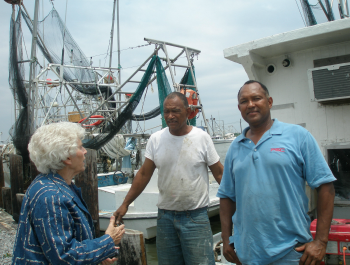Image

Lorna Bourg, President, Southern Mutual Help Association
Challenge: Many small-scale fishers suffered severe financial losses after BP’s 2010 oil spill in the Gulf of Mexico. They are vitally important to the Louisiana economy and culture and needed capital to restart their businesses, but they lacked access financial support.
The catastrophic 2010 BP oil spill in 2010 caused severe financial losses to many small-scale fishers along the Louisiana coast. Oyster fishers lost valuable stocks and shrimpers had to travel far to find safe products. They are vitally important to the Louisiana economy and culture and needed capital to restart their businesses, but the fishers lacked access financial support.
The Southern Mutual Help Association (SMHA) has a long legacy of working to secure affordable housing and capital for underserved populations across coastal Louisiana. When the Deepwater Horizon offshore oil well exploded, we immediately realized that this would mean another devastating financial setback for an industry already underwater.
In the previous decade, fishing families along the Louisiana coast had suffered from hurricanes Katrina, Rita, Gustav and Ike, bringing destruction in their wakes. Furthermore, the small-boated fisher fleet, as small-scale fishers are known, had already suffered a multitude of economic pains as imported seafood flooded American consumer markets through the 2000’s. Struggling fishing operations were barely hanging on by the time the oil spill hit.
Fishing families needed to restart their operations. As the initial disaster faded, so did the funds to pay fishing boats for helping with cleanup efforts. Fishers needed to do repairs, clean their boats, reseed and move oyster beds and get back on the water. Oyster fishers were hit hardest. Some beds were covered in oil while other stocks simply died. As oysters take between two and five years to mature, the impact was devastating. Fishers needed cash flow to restart their businesses.
SMHA needed to do something fast so we created an “Honor Loan” as a way to distribute capital quickly and easily. Louisiana’s fishers often pride themselves as fiercely independent and self-sufficient people. Instead of developing grants, which fishers saw as handouts, we provided loans on their honor. Fishers only had to pay back 90 percent of the loan amount, if and when she or he was able, all with a simple handshake and a signature. Fishers saw repaying the loan as an opportunity to participate in the recovery of the fishing industry and an investment of the future of fishing cultures.
One oyster fishing family, headed by Croatian immigrants named Jure and Vedranka Slavic, had built a livelihood around oysters. The Slavics came to Sister Helen Vincent, a senior advisor to SMHA, shortly after the spill for financial assistance. The spill had destroyed much of the oyster stock. While they, and many others, knew BP would pay out for losses, they couldn’t wait for the lengthy court proceedings.
 The Slavics took an honor loan of $8,500 to reseed the beds and start anew. On a simple promise, the family committed to repay 90 percent of the loan amount at the earliest possible date. Within two years, Jure and Vedranka repaid the loan. They also gave Sister Helen an additional check for more than $1,500 dollars. They wanted to invest in the future of other fishers, and the future of fishing on the Louisiana coast. Today, the Slavics’ son still operates the family oyster business.
The Slavics took an honor loan of $8,500 to reseed the beds and start anew. On a simple promise, the family committed to repay 90 percent of the loan amount at the earliest possible date. Within two years, Jure and Vedranka repaid the loan. They also gave Sister Helen an additional check for more than $1,500 dollars. They wanted to invest in the future of other fishers, and the future of fishing on the Louisiana coast. Today, the Slavics’ son still operates the family oyster business.Dozens of other fisher families were also able to take the honor loans and quickly make necessary adjustments to their operations. Some fishers invested in crabbing when shrimping became difficult. Others invested in renovating their boats to fish farther from home -- and farther from the spill -- while simultaneously upgrading their operations with more efficient freezer technology.
SMHA eventually granted and loaned a total of nearly $1.4 million to fishers in southern Louisiana in the wake of the spill and hurricanes. The honor loans were particularly successful because they were created specifically for a unique population, all of whom were employed, and just needed help resuming operations. When the oil spill hit, these loans became a culturally sensitive way to get swift assistance to a group of people who did not want grants. Of all the loans we made, there was only a 4.04 percent loss rate. From the successes of the honor loans, SMHA is now working to create a sustainable source of affordable capital for fishers in Louisiana.
Many valuable insights were gained from this experience. Rather than providing only capital in the wake of disasters, it is important to find ways for victims to consistently invest in their enterprises, and to adapt to potential changes in the environment. As sea levels rise and storms increase in intensity, small-boated fishers recognize they need to change the way they do business. And that means investing in new models. SMHA’s help can enable these fishers to remain a vital part of Louisiana’s coastal culture and economy.

